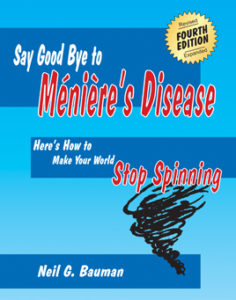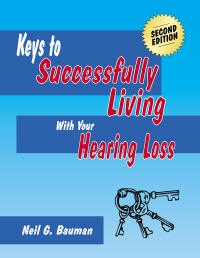by Neil Bauman, Ph.D.
New research reveals that for some people with hearing loss, the tinnitus associated with hearing loss stems from over-active sensory nerves in the face and neck.(1) After hearing loss occurs, for some reason, touch-sensing nerves in the face and neck step up their activity in the brain. The result is that some neurons in the cochlear nucleus become hyperactive. This increased activity has been linked to tinnitus.
For these people, treatment for their tinnitus may be as simple as acupuncture targeted at the nerves in the head and neck.
These findings may also reveal why many people with temporomandibular joint dysfunction (TMD) also suffer from tinnitus.
(1) The Hearing Review, Vol 15, No. 2, February 2008. p. 60.



Hello Dr.Neil
I have mild tinnitus in both ears.
A month before i got blow in my head when i stand up.
After few days i felt my tinnitus loudness increased and i got pain near my ear,
Then I did my CT Scan for head and Neck and an X-Ray of my teeth.
My ENT told nothing to worry as the results appeared normal.
I had swelling in my jaw joints, then I started doing some jaw exercises which helps to recover and it slightly reduced my tinnitus but not as before the blow I had.
Adding to that I feel the third noise which arising from head now, apart from ears,
Please help me to get rid of the noise developed after I had the incident.
I believe I can recover as this not due to any infection.
Please advise
I react to vibration when I touch things or sit in a car that vibrates. Is this the same thing? If I use a drill or anything with a motor I get a permanent increase of baseline to my tinnitus. Much help is appreciated.
Hi Doug:
It’s not quite the same thing as I was talking about with somatosensory tinnitus, but thinking about it, the real vibrations could indeed stimulate any somatosensory nerves and thus exacerbate your tinnitus.
If you get a permanent increase in your tinnitus every time this happens, your tinnitus must be pretty loud by now. Are you sure it doesn’t slowly drop again if you don’t further stimulate it?
You need to calm your nerves down. They are hyperactive for some reason. Drugs could do that. So could anxiety and stress. So could tight muscles in your head, neck and shoulders.
I don’t know enough about your situation to hazard a guess at this point.
Cordially,
Neil
Tanks Dr Bauman.
Initially my tinnitus is from a med 2 years ago. But then sound exposure made it worse, and Olanzpine, just took it once over this past winter. That made it significantly worse and seem to cross a threshold and made me sensitive to vibration. I also have a herniated disk in my neck and those muscles are tight. I had to stop doing McKensey exercises as the made it worse. If I open my jaw, move my head up or down left or right it changes it. I do have anxiety and depression. After just sitting in my car, it vibrates, I get a spike that seems to never go down. I used a electric weed whacker with protection and got a massive spike also that never went down. I don’t think these ever go down. Which is weird as other peoples spikes do. I’m thinking meds Im on. But even sex give me a horrible increase to baseline and I havent since this summer. I also stopped doing push ups and sit ups as the increased heart rate, it seemed or blood to my head increased it as well.
Hi Doug:
Your tinnitus seems to spike with any increase in vigorous exercise, or anything that quickly increases your blood pressure (not your heart rate). Don’t give up exercising altogether, but moderate it such that it doesn’t make your tinnitus much louder.
I don’t know what to say about your sensitivity to vibration. Perhaps it is the combination of the drugs you are on now, or something hyperactivating certain sensory nerves. I’ve not come across this before that I can recall.
Cordially,
Neil
Thank you. Once again I did two things that may have caused it. About 3-4 days ago I reduced my trazodone by shaving off a sliver every night, so much less than 10%. But then today I sanded a bunch of stuff and now my ear is screaming. I think its the vibration again. My ENT says the little bones are isolated. But the liquid the hairs are in are connected to the body. He still thinks its highly unlikely. I spoke with a doc about global hypersensitivity. Theres also a hereditary hearing disorder associated with touch and vibration. Stuffs feeding back into the auditory nerve?
Hi Doug:
What is the name of this hereditary hearing disorder associated with touch and vibration you mentioned? Want to make sure we are on the same page.
Not knowing what condition you are referring to, I think that it is not sensations being fed into the auditory nerve, but into various somatosensory nerves that are transmitted to the brain and erroneously sent to the auditory processing centers in the brain.
Cordially,
Neil
Thank you. This is the link,
https://www.hear-it.org/hearing-loss-can-also-mean-increased-sensitivity-to-vibrations
DFNA2
I drove in the back seat of my car with foam mattress today (some one drove me) and the ringing has increased. I used a dBc meter and it got up in the high 80 dBc, but maybe A weighting is more real. It was a lexus so it was quite. Maybe the low frequency, but I did notice it vibrating a little, only went around the block under a few minutes. ENTs say it has nothing to do with hearing, no one knows what to make of it. Almost like Im making it up. But these arnt spikes, they increase my baseline.
Hi Doug:
Thanks for the link. Now I know what you are talking about.
Normally you check sounds with the meter in the “A” scale reading, not the “C” scale reading as our ears are not near as sensitive to the low-frequency sounds picked up by the C scale. But in your case, since you may be sensitive to the function of the KCNQ4 potassium channels, this may be the better scale to use.
Here’s a bit of background you need. There are five different KCNQ potassium channels in our bodies, but only two are important in tinnitus—KCNQ2 and KCNQ3 according to researchers. But they weren’t looking at the KCNQ4 potassium channel which as the article you referred to, regulates the hair cells for hearing. All KCNQ potassium channels affect neuronal activity. Under normal conditions, these cells fire regularly and then return to their resting states. It’s these potassium channels that help to drag down the cellular electrical activity to its resting state. This allows the cells to function with a regular pattern.
In relation to tinnitus, after exposing your ears to loud sounds, the KCNQ2 and KCNQ3 potassium channels that help regulate the neuron’s electrical activity do not function properly. The result is that the cells remain constantly active, being unable to reach their resting states. This, in turn, results is continuous, random, irregular bursts of activity creating the sensation of constant noise when none exists.
Now notice that your article explains that there are KCNQ4 potassium channels in both your ears and in your skin touch sensors. Like I mentioned previously, these skin sensors are part of the somatosensory pathways. Since they become hyperactive when around vibrations, this flood of signals is sent to the base of your brain where multitasking neurons get overloaded and erroneously send some of these signals to your auditory centers where you hear them as tinnitus. Thus your tinnitus spikes as a result.
Since your body is extra sensitive to these vibrations, you need to calm down the neurons responsible. Your body has two main neurotransmitters–glutamate (which is the main excitatory agent) and GABA (gamma-amino-butric acid) which is the main calming agent.
I call these two guys the teeter-totter guys. When Glutamate is up, GABA is down and vice versa. Now notice that when Glutamate is up–you have run-away activity in the neurons. And conversely, when GABA is up, you have little activity in the neurons.
What you really want is balance–the teeter-totter is horizontal so you get the correct amount of activity–not too much, nor too little.
So coming back to your case, if you increase your intake of GABA, that should calm down this excessive activity and thus calm down your tinnitus.
You might want to run this by your doctor and find the right dose for your body. Note: doctors will likely want to prescribe a drug instead of GABA, but I wouldn’t do that if I were you. Typically they would prescribe Gabapentin or Pregabalin–but these drugs are ototoxic and can make things worse in some ways instead of better.
Anyway, this is how I see it.
Cordially,
Neil